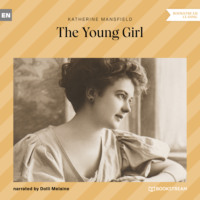 полная версия
полная версияIn a German Pension
The figure of the strange man rose before her—would not be dismissed. “That was the man for me, after all is said and done—a man without a care—who’d give me everything I want and with whom I’d always feel that sense of life and of being in touch with the world. I never wanted to fight—it was thrust on me. Really, there’s a fount of happiness in me, that is drying up, little by little, in this hateful existence. I’ll be dead if this goes on—and”—she stirred in the bed and flung out her arms—“I want passion, and love, and adventure—I yearn for them. Why should I stay here and rot?—I am rotting!” she cried, comforting herself with the sound of her breaking voice. “But if I tell Casimir all this when he comes this afternoon, and he says, ‘Go’—as he certainly will—that’s another thing I loathe about him—he’s under my thumb—what should I do then—where should I go to?” There was nowhere. “I don’t want to work—or carve out my own path. I want ease and any amount of nursing in the lap of luxury. There is only one thing I’m fitted for, and that is to be a great courtesan.” But she did not know how to go about it. She was frightened to go into the streets—she heard of such awful things happening to those women—men with diseases—or men who didn’t pay—besides, the idea of a strange man every night—no, that was out of the question. “If I’d the clothes I would go to a really good hotel and find some wealthy man… like the strange man this morning. He would be ideal. Oh, if I only had his address—I am sure I would fascinate him. I’d keep him laughing all day—I’d make him give me unlimited money....” At the thought she grew warm and soft. She began to dream of a wonderful house, and of presses full of clothes and of perfumes. She saw herself stepping into carriages—looking at the strange man with a mysterious, voluptuous glance—she practised the glance, lying on the bed—and never another worry, just drugged with happiness. That was the life for her. Well, the thing to do was to let Casimir go on his wild-goose chase that evening, and while he was away—What! Also—please to remember—there was the rent to be paid before twelve next morning, and she hadn’t the money for a square meal. At the thought of food she felt a sharp twinge in her stomach, a sensation as though there were a hand in her stomach, squeezing it dry. She was terribly hungry—all Casimir’s fault—and that man had lived on the fat of the land ever since he was born. He looked as though he could order a magnificent dinner. Oh, why hadn’t she played her cards better?—he’d been sent by Providence—and she’d snubbed him. “If I had that time over again, I’d be safe by now.” And instead of the ordinary man who had spoken with her at the door her mind created a brilliant, laughing image, who would treat her like a queen.... “There’s only one thing I could not stand—that he should be coarse or vulgar. Well, he wasn’t—he was obviously a man of the world, and the way he apologised… I have enough faith in my own power and beauty to know I could make a man treat me just as I wanted to be treated.”… It floated into her dreams—that sweet scent of cigarette smoke. And then she remembered that she had heard nobody go down the stone stairs. Was it possible that the strange man was still there?… The thought was too absurd—Life didn’t play tricks like that—and yet—she was quite conscious of his nearness. Very quietly she got up, unhooked from the back of the door a long white gown, buttoned it on—smiling slyly. She did not know what was going to happen. She only thought: “Oh, what fun!” and that they were playing a delicious game—this strange man and she. Very gently she turned the door-handle, screwing up her face and biting her lip as the lock snapped back. Of course, there he was—leaning against the banister rail. He wheeled round as she slipped into the passage.
“Da,” she muttered, folding her gown tightly around her, “I must go downstairs and fetch some wood. Brr! the cold!”
“There isn’t any wood,” volunteered the strange man. She gave a little cry of astonishment, and then tossed her head.
“You again,” she said scornfully, conscious the while of his merry eye, and the fresh, strong smell of his healthy body.
“The landlady shouted out there was no wood left. I just saw her go out to buy some.”
“Story—story!” she longed to cry. He came quite close to her, stood over her and whispered:
“Aren’t you going to ask me to finish my cigarette in your room?”
She nodded. “You may if you want to!”
In that moment together in the passage a miracle had happened. Her room was quite changed—it was full of sweet light and the scent of hyacinth flowers. Even the furniture appeared different—exciting. Quick as a flash she remembered childish parties when they had played charades, and one side had left the room and come in again to act a word—just what she was doing now. The strange man went over to the stove and sat down in her arm-chair. She did not want him to talk or come near her—it was enough to see him in the room, so secure and happy. How hungry she had been for the nearness of someone like that—who knew nothing at all about her—and made no demands—but just lived. Viola ran over to the table and put her arms round the jar of hyacinths.
“Beautiful! Beautiful!” she cried—burying her head in the flowers—and sniffing greedily at the scent. Over the leaves she looked at the man and laughed.
“You are a funny little thing,” said he lazily.
“Why? Because I love flowers?”
“I’d far rather you loved other things,” said the strange man slowly. She broke off a little pink petal and smiled at it.
“Let me send you some flowers,” said the strange man. “I’ll send you a roomful if you’d like them.”
His voice frightened her slightly. “Oh no, thanks—this one is quite enough for me.”
“No, it isn’t”—in a teasing voice.
“What a stupid remark!” thought Viola, and looking at him again he did not seem quite so jolly. She noticed that his eyes were set too closely together—and they were too small. Horrible thought, that he should prove stupid.
“What do you do all day?” she asked hastily.
“Nothing.”
“Nothing at all?”
“Why should I do anything?”
“Oh, don’t imagine for one moment that I condemn such wisdom—only it sounds too good to be true!”
“What’s that?”—he craned forward. “What sounds too good to be true?” Yes—there was no denying it—he looked silly.
“I suppose the searching after Fräulein Schäfer doesn’t occupy all your days.”
“Oh no”—he smiled broadly—“that’s very good! By Jove! no. I drive a good bit—are you keen on horses?”
She nodded. “Love them.”
“You must come driving with me—I’ve got a fine pair of greys. Will you?”
“Pretty I’d look perched behind greys in my one and only hat,” thought she. Aloud: “I’d love to.” Her easy acceptance pleased him.
“How about to-morrow?” he suggested. “Suppose you have lunch with me to-morrow and I take you driving.”
After all—this was just a game. “Yes, I’m not busy to-morrow,” she said.
A little pause—then the strange man patted his leg. “Why don’t you come and sit down?” he said.
She pretended not to see and swung on to the table. “Oh, I’m all right here.”
“No, you’re not”—again the teasing voice. “Come and sit on my knee.”
“Oh no,” said Viola very heartily, suddenly busy with her hair.
“Why not?”
“I don’t want to.”
“Oh, come along”—impatiently.
She shook her head from side to side. “I wouldn’t dream of such a thing.”
At that he got up and came over to her. “Funny little puss cat!” He put up one hand to touch her hair.
“Don’t,” she said—and slipped off the table. “I—I think it’s time you went now.” She was quite frightened now—thinking only: “This man must be got rid of as quickly as possible.”
“Oh, but you don’t want me to go?”
“Yes, I do—I’m very busy.”
“Busy. What does the pussy cat do all day?”
“Lots and lots of things!” She wanted to push him out of the room and slam the door on him—idiot—fool—cruel disappointment.
“What’s she frowning for?” he asked. “Is she worried about anything?” Suddenly serious: “I say—you know, are you in any financial difficulty? Do you want money? I’ll give it to you if you like!”
“Money! Steady on the brake—don’t lose your head!”—so she spoke to herself.
“I’ll give you two hundred marks if you’ll kiss me.”
“Oh, boo! What a condition! And I don’t want to kiss you—I don’t like kissing. Please go!”
“Yes—you do!—yes, you do.” He caught hold of her arms above the elbows. She struggled, and was quite amazed to realise how angry she felt.
“Let me go—immediately!” she cried—and he slipped one arm round her body, and drew her towards him—like a bar of iron across her back—that arm.
“Leave me alone! I tell you. Don’t be mean! I didn’t want this to happen when you came into my room. How dare you?”
“Well, kiss me and I’ll go!”
It was too idiotic—dodging that stupid, smiling face.
“I won’t kiss you!—you brute!—I won’t!” Somehow she slipped out of his arms and ran to the wall—stood back against it—breathing quickly.
“Get out!” she stammered. “Go on now, clear out!”
At that moment, when he was not touching her, she quite enjoyed herself. She thrilled at her own angry voice. “To think I should talk to a man like that!” An angry flush spread over his face—his lips curled back, showing his teeth—just like a dog, thought Viola. He made a rush at her, and held her against the wall—pressed upon her with all the weight of his body. This time she could not get free.
“I won’t kiss you. I won’t. Stop doing that Ugh! you’re like a dog—you ought to find lovers round lamp-posts—you beast—you fiend!”
He did not answer. With an expression of the most absurd determination he pressed ever more heavily upon her. He did not even look at her—but rapped out in a sharp voice: “Keep quiet—keep quiet.”
“Gar—r! Why are men so strong?” She began to cry. “Go away—I don’t want you, you dirty creature. I want to murder you. Oh, my God! if I had a knife.”
“Don’t be silly—come and be good!” He dragged her towards the bed.
“Do you suppose I’m a light woman?” she snarled, and swooping over she fastened her teeth in his glove.
“Ach! don’t do that—you are hurting me!”
She did not let go, but her heart said, “Thank the Lord I thought of this.”
“Stop this minute—you vixen—you bitch.” He threw her away from him. She saw with joy that his eyes were full of tears. “You’ve really hurt me,” he said in a choking voice.
“Of course I have. I meant to. That’s nothing to what I’ll do if you touch me again.”
The strange man picked up his hat. “No thanks,” he said grimly. “But I’ll not forget this—I’ll go to your landlady.”
“Pooh!” She shrugged her shoulders and laughed. “I’ll tell her you forced your way in here and tried to assault me. Who will she believe?—with your bitten hand. You go and find your Schäfers.”
A sensation of glorious, intoxicating happiness flooded Viola. She rolled her eyes at him. “If you don’t go away this moment I’ll bite you again,” she said, and the absurd words started her laughing. Even when the door was closed, hearing him descending the stairs, she laughed, and danced about the room.
What a morning! Oh, chalk it up. That was her first fight, and she’d won—she’d conquered that beast—all by herself. Her hands were still trembling. She pulled up the sleeve of her gown—great red marks on her arms. “My ribs will be blue. I’ll be blue all over,” she reflected. “If only that beloved Casimir could have seen us.” And the feeling of rage and disgust against Casimir had totally disappeared. How could the poor darling help not having any money? It was her fault as much as his, and he, just like her, was apart from the world, fighting it, just as she had done. If only three o’clock would come. She saw herself running towards him and putting her arms round his neck. “My blessed one! Of course we are bound to win. Do you love me still? Oh, I have been horrible lately.”
13. A BLAZE
“Max, you silly devil, you’ll break your neck if you go careering down the slide that way. Drop it, and come to the Club House with me and get some coffee.”
“I’ve had enough for to-day. I’m damp all through. There, give us a cigarette, Victor, old man. When are you going home?”
“Not for another hour. It’s fine this afternoon, and I’m getting into decent shape. Look out, get off the track; here comes Fräulein Winkel. Damned elegant the way she manages her sleigh!”
“I’m cold all through. That’s the worst of this place—the mists—it’s a damp cold. Here, Forman, look after this sleigh—and stick it somewhere so that I can get it without looking through a hundred and fifty others to-morrow morning.”
They sat down at a small round table near the stove and ordered coffee. Victor sprawled in his chair, patting his little brown dog Bobo and looking, half laughingly, at Max.
“What’s the matter, my dear? Isn’t the world being nice and pretty?”
“I want my coffee, and I want to put my feet into my pocket—they’re like stones.... Nothing to eat, thanks—the cake is like underdone india-rubber here.”
Fuchs and Wistuba came and sat at their table. Max half turned his back and stretched his feet out to the oven. The three other men all began talking at once—of the weather—of the record slide—of the fine condition of the Wald See for skating.
Suddenly Fuchs looked at Max, raised his eyebrows and nodded across to Victor, who shook his head.
“Baby doesn’t feel well,” he said, feeding the brown dog with broken lumps of sugar, “and nobody’s to disturb him—I’m nurse.”
“That’s the first time I’ve ever known him off colour,” said Wistuba. “I’ve always imagined he had the better part of this world that could not be taken away from him. I think he says his prayers to the dear Lord for having spared him being taken home in seven basketsful to-night. It’s a fool’s game to risk your all that way and leave the nation desolate.”
“Dry up,” said Max. “You ought to be wheeled about on the snow in a perambulator.”
“Oh, no offence, I hope. Don’t get nasty.... How’s your wife, Victor?”
“She’s not at all well. She hurt her head coming down the slide with Max on Sunday. I told her to stay at home all day.”
“I’m sorry. Are you other fellows going back to the town or stopping on here?”
Fuchs and Victor said they were stopping—Max did not answer, but sat motionless while the men paid for their coffee and moved away. Victor came back a moment and put a hand on his shoulder.
“If you’re going right back, my dear, I wish you’d look Elsa up and tell her I won’t be in till late. And feed with us to-night at Limpold, will you? And take some hot grog when you get in.”
“Thanks, old fellow, I’m all right. Going back now.”
He rose, stretched himself, buttoned on his heavy coat and lighted another cigarette.
From the door Victor watched him plunging through the heavy snow—head bent—hands thrust in his pockets—he almost appeared to be running through the heavy snow towards the town.
Someone came stamping up the stairs—paused at the door of her sitting-room, and knocked.
“Is that you, Victor?” she called.
“No, it is I… can I come in?”
“Of course. Why, what a Santa Claus! Hang your coat on the landing and shake yourself over the banisters. Had a good time?”
The room was full of light and warmth. Elsa, in a white velvet tea-gown, lay curled up on the sofa—a book of fashions on her lap, a box of creams beside her.
The curtains were not yet drawn before the windows and a blue light shone through, and the white boughs of the trees sprayed across.
A woman’s room—full of flowers and photographs and silk pillows—the floor smothered in rugs—an immense tiger-skin under the piano—just the head protruding—sleepily savage.
“It was good enough,” said Max. “Victor can’t be in till late. He told me to come up and tell you.”
He started walking up and down—tore off his gloves and flung them on the table.
“Don’t do that, Max,” said Elsa, “you get on my nerves. And I’ve got a headache to-day; I’m feverish and quite flushed.... Don’t I look flushed?”
He paused by the window and glanced at her a moment over his shoulder.
“No,” he said; “I didn’t notice it.”
“Oh, you haven’t looked at me properly, and I’ve got a new tea-gown on, too.” She pulled her skirts together and patted a little place on the couch.
“Come along and sit by me and tell me why you’re being naughty.”
But, standing by the window, he suddenly flung his arm across his eyes.
“Oh,” he said, “I can’t. I’m done—I’m spent—I’m smashed.”
Silence in the room. The fashion-book fell to the floor with a quick rustle of leaves. Elsa sat forward, her hands clasped in her lap; a strange light shone in her eyes, a red colour stained her mouth.
Then she spoke very quietly.
“Come over here and explain yourself. I don’t know what on earth you are talking about.”
“You do know—you know far better than I. You’ve simply played with Victor in my presence that I may feel worse. You’ve tormented me—you’ve led me on—offering me everything and nothing at all. It’s been a spider-and-fly business from first to last—and I’ve never for one moment been ignorant of that—and I’ve never for one moment been able to withstand it.”
He turned round deliberately.
“Do you suppose that when you asked me to pin your flowers into your evening gown—when you let me come into your bedroom when Victor was out while you did your hair—when you pretended to be a baby and let me feed you with grapes—when you have run to me and searched in all my pockets for a cigarette—knowing perfectly well where they were kept—going through every pocket just the same—I knowing too—I keeping up the farce—do you suppose that now you have finally lighted your bonfire you are going to find it a peaceful and pleasant thing—you are going to prevent the whole house from burning?”
She suddenly turned white and drew in her breath sharply.
“Don’t talk to me like that. You have no right to talk to me like that. I am another man’s wife.”
“Hum,” he sneered, throwing back his head, “that’s rather late in the game, and that’s been your trump card all along. You only love Victor on the cat-and-cream principle—you a poor little starved kitten that he’s given everything to, that he’s carried in his breast, never dreaming that those little pink claws could tear out a man’s heart.”
She stirred, looking at him with almost fear in her eyes.
“After all”—unsteadily—“this is my room; I’ll have to ask you to go.”
But he stumbled towards her, knelt down by the couch, burying his head in her lap, clasping his arms round her waist.
“And I love you—I love you; the humiliation of it—I adore you. Don’t—don’t—just a minute let me stay here—just a moment in a whole life—Elsa! Elsa!”
She leant back and pressed her head into the pillows.
Then his muffled voice: “I feel like a savage. I want your whole body. I want to carry you away to a cave and love you until I kill you—you can’t understand how a man feels. I kill myself when I see you—I’m sick of my own strength that turns in upon itself, and dies, and rises new born like a Phoenix out of the ashes of that horrible death. Love me just this once, tell me a lie, say that you do—you are always lying.”
Instead, she pushed him away—frightened.
“Get up,” she said; “suppose the servant came in with the tea?”
“Oh, ye gods!” He stumbled to his feet and stood staring down at her.
“You’re rotten to the core and so am I. But you’re heathenishly beautiful.”
The woman went over to the piano—stood there—striking one note—her brows drawn together. Then she shrugged her shoulders and smiled.
“I’ll make a confession. Every word you have said is true. I can’t help it. I can’t help seeking admiration any more than a cat can help going to people to be stroked. It’s my nature. I’m born out of my time. And yet, you know, I’m not a common woman. I like men to adore me—to flatter me—even to make love to me—but I would never give myself to any man. I would never let a man kiss me… even.”
“It’s immeasurably worse—you’ve no legitimate excuse. Why, even a prostitute has a greater sense of generosity!”
“I know,” she said, “I know perfectly well—but I can’t help the way I’m built.... Are you going?”
He put on his gloves.
“Well,” he said, “what’s going to happen to us now?”
Again she shrugged her shoulders.
“I haven’t the slightest idea. I never have—just let things occur.”
“All alone?” cried Victor. “Has Max been here?”
“He only stayed a moment, and wouldn’t even have tea. I sent him home to change his clothes.... He was frightfully boring.”
“You poor darling, your hair’s coming down. I’ll fix it, stand still a moment… so you were bored?”
“Um-m—frightfully.... Oh, you’ve run a hairpin right into your wife’s head—you naughty boy!”
She flung her arms round his neck and looked up at him, half laughing, like a beautiful, loving child.
“God! What a woman you are,” said the man. “You make me so infernally proud—dearest, that I… I tell you!”









